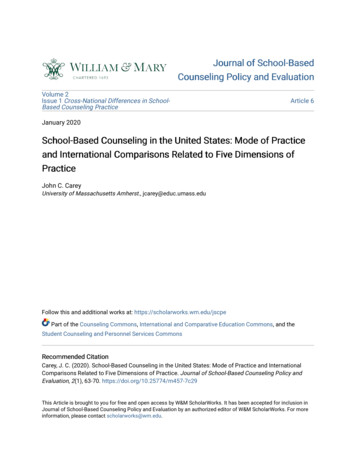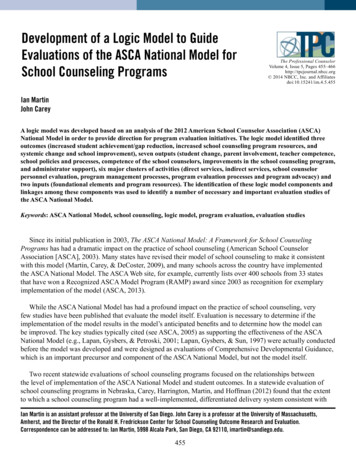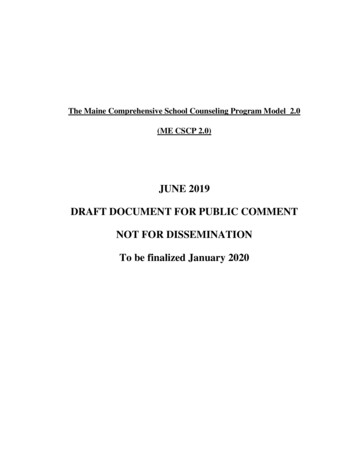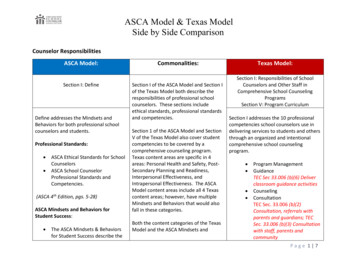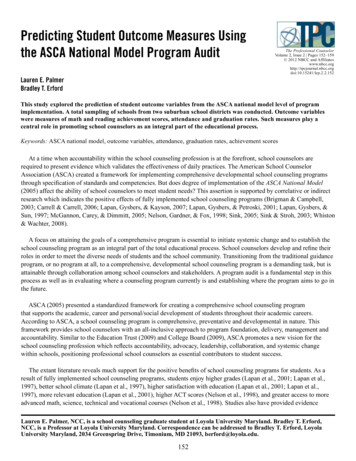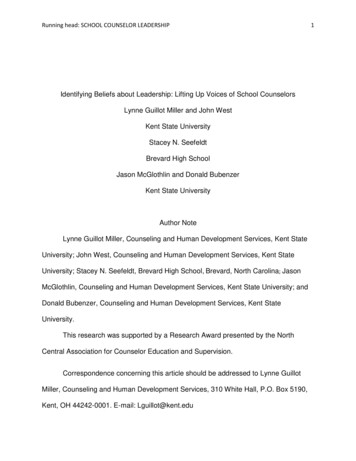
Transcription
ASCA School CounselorCompetenciesThe ASCA School Counselor Competencies outline the knowledge, abilities,skills and attitudes that ensure school counselors are equipped to meet therigorous demands of the profession and the needs of pre-K–12 students. Thesecompetencies help ensure new and experienced school counselors are equippedto establish, maintain and enhance a comprehensive school counseling programaddressing academic achievement, career planning and personal/social development.Organized around and consistent with “The ASCA National Model: A Frameworkfor School Counseling Programs (Third Edition),” the competencies can be used in avariety of ways including:School counselorsn Self-assess their own competenciesn Formulate an appropriate professional development planSchool administratorsn Guide the recruitment and selection of competent school counselorsn Develop or inform meaningful school counselor performance evaluationSchool counselor education programsn Establish benchmarks for ensuring school education students graduate with theknowledge, skills and attitudes needed for developing comprehensive schoolcounseling programs.I.SCHOOL COUNSELING PROGRAMSSchool counselors should possess the knowledge, abilities, skills and attitudes necessary toplan, organize, implement and evaluate a comprehensive, developmental, results-based schoolcounseling program that aligns with the ASCA National Model.I-A: KnowledgeASCA’s position statement, The Professional School Counselor and School CounselingPreparation Programs, states that school counselors should articulate and demonstrate anunderstanding of:n I-A-1.The organizational structure and governance of the American educational systemas well as cultural, political and social influences on current educational practicesn I-A-2.The organizational structure and components of an effective school counselingprogram that aligns with the ASCA National Modeln I-A-3.Barriers to student learning and use of advocacy and data-driven school counselingpractices to close the achievement/opportunity gapRevised, 2012
n I-A-4.n I-A-5.n I-A-6.n I-A-7.n I-A-8.n I-A-9.Leadership principles and theoriesIndividual counseling, group counseling and classroom instruction ensuringequitable access to resources promoting academic achievement, career developmentand personal/social development for every studentCollaborations with stakeholders such as parents and guardians, teachers,administrators and community leaders to create learning environments thatpromote educational equity and success for every studentLegal, ethical and professional issues in pre-K–12 schoolsDevelopmental theory, learning theories, social justice theory, multiculturalism,counseling theories and career counseling theoriesThe continuum of mental health services, including prevention and interventionstrategies to enhance student successI-B: Abilities and SkillsAn effective school counselor is able to accomplish measurable objectives demonstrating thefollowing abilities and skills.n I-B-1.Plans, organizes, implements and evaluates a school counseling program aligningwith the ASCA National Modeln I-B-1a. Creates a vision statement examining the professional and personal competenciesand qualities a school counselor should possessn I-B-1b. Describes the rationale for a comprehensive school counseling programn I-B-1c. Applies the school counseling themes of leadership, advocacy, collaboration andsystemic change, which are critical to a successful school counseling programn I-B-1d. Describes, defines and identifies the qualities of an effective school counselingprogramn I-B-1e. Describes the benefits of a comprehensive school counseling program for allstakeholders, including students, parents, teachers, administrators, school boards,department of education, school counselors, counselor educators, communitystakeholders and business leadersn I-B-1f. Describes the history of school counseling to create a context for the current stateof the profession and comprehensive school counseling programsn I-B-1g. Uses technology effectively and efficiently to plan, organize, implement andevaluate the comprehensive school counseling programn I-B-1h. Demonstrates multicultural, ethical and professional competencies in planning,organizing, implementing and evaluating the comprehensive school counselingprogramn I-B-2.n I-B-2a.n I-B-2b.n I-B-2c.n I-B-2d.n I-B-2e.Serves as a leader in the school and community to promote and support studentsuccessUnderstands and defines leadership and its role in comprehensive school counselingprogramsIdentifies and applies a model of leadership to a comprehensive school counselingprogramIdentifies and demonstrates professional and personal qualities and skills ofeffective leadersIdentifies and applies components of the ASCA National Model requiringleadership, such as an advisory council, management tools and accountabilityCreates a plan to challenge the non-counseling tasks that are assigned to schoolcounselors2WWW.SCHOOLCOUNSELOR.ORG
n I-B-3.n I-B-3a.n I-B-3b.n I-B-3c.n I-B-3d.n I-B-3e.n I-B-4.n I-B-4a.n I-B-4b.n I-B-4c.n I-B-4d.n I-B-4e.n I-B-5.n I-B-5a.n I-B-5b.n I-B-5c.Advocates for student successUnderstands and defines advocacy and its role in comprehensive school counselingprogramsIdentifies and demonstrates benefits of advocacy with school and communitystakeholdersDescribes school counselor advocacy competencies, which include dispositions,knowledge and skillsReviews advocacy models and develops a personal advocacy planUnderstands the process for development of policy and procedures at the building,district, state and national levelsCollaborates with parents, teachers, administrators, community leaders and otherstakeholders to promote and support student successDefines collaboration and its role in comprehensive school counseling programsIdentifies and applies models of collaboration for effective use in a schoolcounseling program and understands the similarities and differences betweenconsultation, collaboration and counseling and coordination strategiesCreates statements or other documents delineating the various roles of studentservice providers, such as school social worker, school psychologist or schoolnurse, and identifies best practices for collaborating to affect student successUnderstands and knows how to apply a consensus-building process to fosteragreement in a groupUnderstands how to facilitate group meetings to effectively and efficiently meetgroup goalsActs as a systems change agent to create an environment promoting and supportingstudent successDefines and understands system change and its role in comprehensive schoolcounseling programsDevelops a plan to deal with personal (emotional and cognitive) and institutionalresistance impeding the change processUnderstands the impact of school, district and state educational policies,procedures and practices supporting and/or impeding student successI-C: AttitudesSchool counselors believe:n I-C-1.Every student can learn, and every student can succeedn I-C-2.Every student should have access to and opportunity for a high-quality educationn I-C-3.Every student should graduate from high school and be prepared for employmentor college and other post-secondary educationn I-C-4.Every student should have access to a school counseling programn I-C-5.Effective school counseling is a collaborative process involving school counselors,students, parents, teachers, administrators, community leaders and otherstakeholdersn I-C-6.School counselors can and should be leaders in the school and districtn I-C-7.The effectiveness of school counseling programs should be measurable usingprocess, perception and outcome dataWWW.SCHOOLCOUNSELOR.ORG3
II.FOUNDATIONSSchool counselors should possess the knowledge, abilities, skills and attitudes necessary toestablish the foundations of a school counseling program aligning with the ASCA NationalModel.II-A: KnowledgeSchool counselors should articulate and demonstrate an understanding of:n II-A-1. Beliefs and vision of the school counseling program that align with current schoolimprovement and student success initiatives at the school, district and state leveln II-A-2. Educational systems, philosophies and theories and current trends in education,including federal and state legislationn II-A-3. Learning theoriesn II-A-4. History and purpose of school counseling, including traditional and transformedroles of school counselorsn II-A-5. Human development theories and developmental issues affecting student successn II-A-6. District, state and national student standards and competencies, including ASCAStudent Standards and other student standards that may complement and informthe comprehensive school counseling programn II-A-7. Legal and ethical standards and principles of the school counseling profession andeducational systems, including district and building policiesn II-A-8. The three domains of academic achievement, career planning and personal/socialdevelopmentII-B: Abilities and SkillsAn effective school counselor is able to accomplish measurable objectives demonstrating thefollowing abilities and skills:n II-B-1. Develops the beliefs and vision of the school counseling program that align withcurrent school improvement and student success initiatives at the school, districtand state leveln II-B-1a. Examines personal, district and state beliefs, assumptions and philosophies aboutstudent success, specifically what they should know and be able to don II-B-1b. Demonstrates knowledge of a school’s particular educational vision and missionn II-B-1c. Conceptualizes and writes a personal philosophy about students, families, teachers,school counseling programs and the educational process consistent with theschool’s educational philosophy and missionn II-B-1d. Writes a school counseling vision statement that describes a future world in whichthe school counseling goals and strategies are being successfully achievedn II-B-2.Develops a school counseling mission statement aligning with the school, districtand state missionn II-B-2a. Critiques a school district mission statement and identifies or writes a missionstatement aligning with beliefsn II-B-2b. Writes a school counseling mission statement that is specific, concise, clear andcomprehensive, describing a school counseling program’s purpose and a vision ofthe program’s benefits for every studentn II-B-2c. Communicates the vision and mission of the school counseling program to allappropriate stakeholders4WWW.SCHOOLCOUNSELOR.ORG
n II-B-3.Uses student standards, such as ASCA Student Standards and other appropriatestudent standards such as district or state standards, to drive the implementation ofa comprehensive school counseling programn II-B-3a. Crosswalks the ASCA Student Standards with other appropriate student standardsn II-B-3b. Prioritizes student standards that align with the school’s goalsn II-B-4.n II-B-4a.n II-B-4b.n II-B-4c.n II-B-4d.n II-B-4e.n II-B-4f.n II-B-4g.n II-B-4h.n II-B-4i.n II-B-4j.n II-B-4k.Applies the ethical standards and principles of the school counseling profession andadheres to the legal aspects of the role of the school counselorPractices ethical principles of the school counseling profession in accordance withthe ASCA Ethical Standards for School CounselorsUnderstands the legal and ethical nature of working in a pluralistic, multiculturaland technological societyUnderstands and practices in accordance with school district policy and local, stateand federal statutory requirementsUnderstands the unique legal and ethical nature of working with minor students ina school settingAdvocates responsibly for school board policy and local, state and federal statutoryrequirements in students’ best interestsResolves ethical dilemmas by employing an ethical decision-making modelappropriate to work in schoolsModels ethical behaviorContinuously engages in professional development and uses resources to informand guide ethical and legal workPractices within the ethical and statutory limits of confidentialityContinually seeks consultation and supervision to guide legal and ethical decisionmaking and to recognize and resolve ethical dilemmasUnderstands and applies an ethical and legal obligation not only to students but toparents, administration and teachers as wellII-C: AttitudesSchool counselors demonstrate their attitudes and beliefs that all students deserve access to acomprehensive program that:n II-C-1. Has an impact on every student rather than a series of services provided only tostudents in needn II-C-2. Is an integral component of student success and the overall mission of the schooland school districtn II-C-3. Promotes and supports academic achievement, career planning and personal/socialdevelopment for every studentn II-C-4. Adheres to school and district policies, state laws and regulations and professionalethics standardsn II-C-5. Is intentional in addressing the information, opportunity and achievement gapsWWW.SCHOOLCOUNSELOR.ORG5
III.MANAGEMENTSchool counselors should possess the knowledge, abilities, skills and attitudes necessary tomanage a school counseling program aligning with the ASCA National Model.III-A: KnowledgeSchool counselors should articulate and demonstrate an understanding of:n III-A-1. Leadership principles, including sources of power and authority and formal andinformal leadershipn III-A-2. Organization theory to facilitate advocacy, collaboration and systemic changen III-A-3. Presentation skills for programs such as teacher in-services, parent workshops andpresentation of results reports to school boardsn III-A-4. Time management, including long- and short-term management using tools such asschedules and calendarsn III-A-5. Data-driven decision makingn III-A-6. Current and emerging technologies such as use of the Internet, Web-basedresources and information management systemsIII-B: Abilities and SkillsAn effective school counselor is able to accomplish measurable objectives demonstrating thefollowing abilities and skills:n III-B-1. Self-evaluates his/her own competencies leading to and resulting in the formulationof an appropriate professional development plann III-B-1a. Conducts a school counseling program assessmentn III-B-1b. Negotiates a management plan for the comprehensive school counselingprogram with the administratorn III-B-1c. Discusses and develops the management component of the school counselingprogram with the other members of the school counseling staffn III-B-1d. Presents school counseling management tools to the principal, and finalizes anannual school counseling agreementn III-B-1e. Discusses the anticipated program results when implementing the action plans forthe school yearn III-B-1f. Participates in school counseling and education-related professionalorganizationsn III-B-1g. Develops a yearly professional development plan demonstrating how the schoolcounselor advances relevant knowledge, skills and dispositionsn III-B-1h. Communicates effective goals and benchmarks for meeting and exceedingexpectations consistent with the administrator/school counselor annualagreement and district performance appraisalsn III-B-1i. Uses personal reflection, consultation and supervision to promote professionalgrowth and developmentn III-B-2. Establishes and convenes an advisory council for the comprehensive schoolcounseling programn III-B-2a. Uses leadership skills to facilitate vision and positive change for the comprehensiveschool counseling programn III-B-2b. Determines appropriate education stakeholders who should be represented on theadvisory counciln III-B-2c. Develops effective and efficient meeting agendasn III-B-2d. Reviews school data, school counseling program assessment and school counselingprogram goals with the advisory council6WWW.SCHOOLCOUNSELOR.ORG
n III-B-2e. Records meeting notes and distributes as appropriaten III-B-2f. Analyzes and incorporates feedback from the advisory council related to schoolcounseling program goals as appropriaten III-B-3. Accesses or collects relevant data, including process, perception and outcome data,to monitor and improve student behavior and achievementn III-B-3a. Reviews and disaggregates student achievement, attendance and behavior data toidentify and implement interventions as neededn III-B-3b. Uses data to identify policies, practices and procedures leading to successes,systemic barriers and areas of weaknessn III-B-3c. Uses student data to demonstrate a need for systemic change in areas such ascourse enrollment patterns; equity and access; and achievement, opportunityand/or information gapsn III-B-3d. Understands and uses data to establish goals and activities to close theachievement, opportunity and/or information gapn III-B-3e. Knows how to use data to identify gaps between and among different groups ofstudentsn III-B-3f. Uses school data to identify and assist individual students who do not perform atgrade level and do not have opportunities and resources to be successful in schooln III-B-3g. Knows and understands theoretical and historical basis for assessment techniquesn III-B-4. Assesses use of time in direct and indirect student services and programmanagement and school supportn III-B-4a. Organizes and manages time to effectively implement a comprehensive schoolcounseling programn III-B-4b. Identifies appropriate distribution of school counselor’s time based on the schooldata and program goalsn III-B-4c. Creates a rationale for school counselor’s use of time in the delivery component tofocus on the goals of the comprehensive school counseling programn III-B-4d. Identifies and evaluates fair-share responsibilities, which articulate appropriate andinappropriate counseling and non-counseling activitiesn III-B-5. Develops calendars to ensure the effective implementation of the school counselingprogramn III-B-5a. Creates annual and weekly calendars to plan activities to reflect school counselingprogram goalsn III-B-5b. Demonstrates time-management skills including scheduling, publicizing andprioritizing time and tasksn III-B-6. Designs and implements action plans aligning with school and school counselingprogram goalsn III-B-6a. Uses appropriate academic and behavioral data to develop school counselingcore curriculum, small-group and closing-the-gap action plans and determinesappropriate students for the target group or interventionsn III-B-6b. Identifies ASCA domains, standards and competencies being addressed by each plann III-B-6c. Creates lesson plans related to the school counseling core curriculum identifyingwhat will be delivered, to whom it will be delivered, how it will be delivered andhow student attainment of competencies will be evaluatedn III-B-6d. Determines the intended impact on academics, attendance and behaviorn III-B-6e. Identifies appropriate activities to accomplish objectivesn III-B-6f. Identifies appropriate resources neededn III-B-6g. Identifies data-collection strategies to gather process, perception and outcome datan III-B-6h. Shares results of action plans with staff, parents and community.WWW.SCHOOLCOUNSELOR.ORG7
n III-B-7. Implements program management and school support activities for thecomprehensive school counseling programn III-B-7a. Creates a program management and school support planning document addressingschool counselor’s responsibilities for program management and professionaldevelopmentn III-B-7b. Coordinates activities that establish, maintain and enhance the school counselingprogram as well as other educational programsn III-B-8. Conducts self-appraisal related to school counseling skills and performanceIII-C: AttitudesSchool counselors believe:n III-C-1. A school counseling program/department must be managed like other programsand departments in a schooln III-C-2. Planning, organizing, implementing and evaluating a school counseling programare critical responsibilities for a school counselorn III-C-3. Management of a school counseling program must be done in collaboration withadministratorsIV.DELIVERYSchool counselors should possess the knowledge, abilities, skills and attitudes necessary todeliver a school counseling program aligning with the ASCA National Model.IV-A: KnowledgeSchool counselors should articulate and demonstrate an understanding of:n IV-A-1. The distinction between direct and indirect student servicesn IV-A-2. The concept of a school counseling core curriculumn IV-A-3. Counseling theories and techniques that work in school, such as rational emotivebehavior therapy, reality therapy, cognitive-behavioral therapy, Alderian, solutionfocused brief counseling, person-centered counseling and family systemsn IV-A-4. Counseling theories and techniques in different settings, such as individualplanning, group counseling and classroom lessonsn IV-A-5. Classroom managementn IV-A-6. Principles of career planning and college admissions, including financial aid andathletic eligibilityn IV-A-7. Principles of working with various student populations based on characteristicssuch as ethnic and racial background, English language proficiency, special needs,religion, gender and incomen IV-A-8. Principles of multi-tiered approaches within the context of a comprehensive schoolcounseling programn IV-A-9. Responsive services (counseling and crisis response) including grief andbereavementn IV-A-10. The differences between counseling, collaboration and consultation, especially thepotential for dual roles with parents, guardians and other caretakers8WWW.SCHOOLCOUNSELOR.ORG
IV-B: Abilities and SkillsAn effective school counselor is able to accomplish measurable objectives demonstrating thefollowing abilities and skills.Direct Student ServicesSchool Counseling Core Curriculumn IV-B-1. Implements the school counseling core curriculumn IV-B-1a. Identifies appropriate curriculum aligned to ASCA Student Standardsn IV-B-1b. Develops and presents a developmental school counseling core curriculumaddressing all students’ needs based on student datan IV-B-1c. Demonstrates classroom management and instructional skillsn IV-B-1d. Develops materials and instructional strategies to meet student needs and schoolgoalsn IV-B-1e. Encourages staff involvement to ensure the effective implementation of the schoolcounseling core curriculumn IV-B-1f. Knows, understands and uses a variety of technology in the delivery of schoolcounseling core curriculum activitiesn IV-B-1g. Understands multicultural and pluralistic trends when developing and choosingschool counseling core curriculumn IV-B-1h. Understands and is able to build effective, high-quality peer helper programsIndividual Student Planningn IV-B-2. Facilitates individual student planningn IV-B-2a. Understands individual student planning as a component of a comprehensiveprogramn IV-B-2b. Develops strategies to implement individual student planning, such as strategiesfor appraisal, advisement, goal-setting, decision-making, social skills, transition orpost-secondary planningn IV-B-2c. Helps students establish goals and develops and uses planning skills incollaboration with parents or guardians and school personneln IV-B-2d. Understands career opportunities, labor market trends and global economics anduses various career assessment techniques to help students understand their abilitiesand career interestsn IV-B-2e. Helps students learn the importance of college and other post-secondary educationand helps students navigate the college admissions processn IV-B-2f. Understands the relationship of academic performance to the world of work,family life and community servicen IV-B-2g. Understands methods for helping students monitor and direct their own learningand personal/social and career developmentResponsive Servicesn IV-B-3. Provides responsive servicesn IV-B-3a. Lists and describes interventions used in responsive services, such as individual/small-group counseling and crisis responsen IV-B-3b. Understands appropriate individual and small-group counseling theories andtechniques such as rational emotive behavior therapy, reality therapy, cognitivebehavioral therapy, Adlerian, solution-focused brief counseling, person-centeredcounseling and family systemsn IV-B-3c. Demonstrates an ability to provide counseling for students during times oftransition, separation, heightened stress and critical changen IV-B-3d. Understands what defines a crisis, the appropriate response and a variety ofintervention strategies to meet the needs of the individual, group or schoolcommunity before, during and after crisis responseWWW.SCHOOLCOUNSELOR.ORG9
n IV-B-3e. Provides team leadership to the school and community in a crisisn IV-B-3f. Involves appropriate school and community professionals as well as the family in acrisis situationn IV-B-3g. Understands the nature of academic, career and personal/social counseling inschools and the similarities and differences among school counseling and othertypes of counseling, such as mental health, marriage and family and substanceabuse counseling, within a continuum of caren IV-B-3h. Understands the role of the school counselor and the school counseling program inthe school crisis planIndirect Student ServicesReferralsn IV-B-4a. Understands how to make referrals to appropriate professionals when necessaryn IV-B-4b. Compiles referral resources to utilize with students, staff and families to effectivelyaddress issuesn IV-B-4c. Develops a list of community agencies and service providers for student referralsConsultationn IV-B-5a. Shares strategies that support student achievement with parents, teachers, othereducators and community organizationsn IV-B-5b. Applies appropriate counseling approaches to promoting change among consulteeswithin a consultation approachn IV-B-5c. Works with education stakeholders to better understand student needs and toidentify strategies that promote student achievementCollaborationn IV-B-6a. Partners with parents, teachers, administrators and education stakeholders forstudent achievement and successn IV-B-6b. Conducts in-service training or workshops for other stakeholders to share schoolcounseling expertisen IV-B-6c. Understands and knows how to provide supervision for school counseling internsconsistent with the principles of the ASCA National ModelIV-C: AttitudesSchool counselors believe:n IV-C-1. School counseling is one component in the continuum of care that should beavailable to all studentsn IV-C-2. School counselors coordinate and facilitate counseling and other services to ensureall students receive the care they need, even though school counselors may notpersonally provide the care themselvesn IV-C-3. School counselors engage in developmental counseling and short-term responsivecounselingn IV-C-4. School counselors should refer students to district or community resources to meetmore extensive needs such as long-term therapy or diagnoses of disorders10WWW.SCHOOLCOUNSELOR.ORG
V.ACCOUNTABILITYSchool counselors should possess the knowledge, abilities, skills and attitudes necessary tomonitor and evaluate the processes and results of a school counseling program aligning withthe ASCA National Model.V-A: KnowledgeSchool counselors should articulate and demonstrate an understanding of:n V-A-1. Basic concepts of results-based school counseling and accountability issuesn V-A-2. Basic research sampling, methodology and analysis concepts to understandresearch outcomes and conduct action researchn V-A-3. Use of data to evaluate program effectiveness and to determine program needsn V-A-4. School counseling program assessments and results reportsV-B: Abilities and SkillsAn effective school counselor is able to accomplish measurable objectives demonstrating thefollowing abilities and skills.n V-B-1. Analyzes data from school data profile and results reports to evaluate studentoutcomes and program effectiveness and to determine program needsn V-B-1a. Analyzes use of time to determine how much time is spent in school counselingprogram components and considers best use of time compared to student needs asidentified through student datan V-B-1b. Analyzes results from school counseling program assessmentn V-B-1c. Uses formal and informal methods of program evaluation to design andenhance comprehensive school counseling programsn V-B-1d. Uses student data to support decision-making in designing effective schoolcounseling programs and interventionsn V-B-1e. Measures and analyzes results attained from school counseling core curriculum,small group and closing-the-gap activitiesn V-B-1f. Works with members of the school counseling team and with the administration todecide how school counseling programs are evaluated and how results are sharedn V-B-1g. Analyzes and interprets process, perception and outcome datan V-B-1h. Reviews progress toward program goalsn V-B-1i. Uses technology in conducting research and program evaluationn V-B-1j. Reports program results to the school counseling communityn V-B-1k. Uses data to demonstrate the value the school counseling program adds to studentachievementn V-B-1l. Uses results obtained for program improvementn V-B-2.Understands and advocates for appropriate school counselor performanceappraisal process based on school counselor competencies and implementation ofthe comprehensive school counseling programn V-B-2a. Analyzes self-assessment related to school counseling skills and performancen V-B-2b. Identifies how school counseling activities fit within categories of a performanceappraisal instrumentn V-B-2c. Encourages administrators to use a performance appraisal instrument reflectingappropriate responsibilities for school counselorsWWW.SCHOOLCOUNSELOR.ORG11
n V-B-3a. Compares current school counseling program implementation with the ASCANational Modeln V-B-3b. Shares the results of the program assessment with administrators, the advisorycouncil and other appropriate stakeholdersn V-B-3c. Identifies areas for improvement for the s
School counselors should possess the knowledge, abilities, skills and attitudes necessary to plan, organize, implement and evaluate a comprehensive, developmental, results-based school counseling program that aligns with the ASCA National Model. I-A: Knowledge ASCA's position statement, The Professional School Counselor and School Counseling


